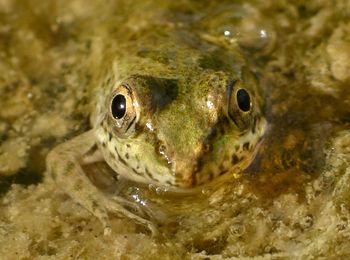January, 2012
Seeing Nature
by Valerie
Every living thing on our planet must absorb information from its environment in order to survive. It might be as simple as an alga cell responding to sunlight or an amoeba moving away from a noxious substance. As organisms become more complex, so do their abilities to perceive their surroundings and their repertoire of reactions to each stimulus. We humans like to think that we are the zenith of evolution. While we are just another mammal, albeit one that has managed to make a rather big impact on our planet, there are a few ways in which we might feel superior to our fellow creatures. We can create and use more complex tools. Our dens are marvels of engineering, perhaps beyond even those of paper wasps and termites. We've proven ourselves to be more destructive than any other species, but that is perhaps not something to brag about. And we are capable of creating, and appreciating, such diverse phenomena as art, music, and anagrams. Whether we choose to use it or not, our big brains have an amazing capacity to THINK.
Of all our senses, sight is perhaps the single more important for observation. In fact, we tend to equate one with the other, although it is also possible to "observe" by listening, smelling, tasting or touching. The more ways we have of gathering information, the more complete our perception of the world will be, and the more we will learn. It all seems to focus on learning, doesn't it? A large brain has an insatiable hunger for data. It has been called "grist for the mill," the raw materials which we then process to form our view of the environment around us.
Although seeing is key, the art of observation includes far more. Mere looking is not an end in itself; the goal is better comprehension. The first part is simple, but the second takes a lot more effort. Our incentive for that much work? Back in the early days of our species, better understanding of nature meant a better survival rate. Nowadays, our surroundings are so safe that attentiveness is no longer necessary to stay alive. Look at drivers who text while operating their vehicles. If they all died because of this gross negligence then nobody would do it anymore. But the majority do manage to drive with a minimum of awareness and without adverse consequences.
 So, if we don't absolutely NEED to be observant, why bother? Once again, the answer lies with our large and complex brains. Some people may be content to live their entire lives knowing zilch about cellular biology, astronomy, computer programming, nuclear physics, the mating behaviors of warblers, or the survival strategies of katydids (or any of the millions of other aspects of our physical world). But for others, there is an urge to comprehend things at a deeper level. One little bit might grab our attention and awaken a desire to know more. Considering that many little bits can grab our attention, there is a lifetime full of learning available to us, if we want to avail ourselves of it. All it takes is curiosity.
So, if we don't absolutely NEED to be observant, why bother? Once again, the answer lies with our large and complex brains. Some people may be content to live their entire lives knowing zilch about cellular biology, astronomy, computer programming, nuclear physics, the mating behaviors of warblers, or the survival strategies of katydids (or any of the millions of other aspects of our physical world). But for others, there is an urge to comprehend things at a deeper level. One little bit might grab our attention and awaken a desire to know more. Considering that many little bits can grab our attention, there is a lifetime full of learning available to us, if we want to avail ourselves of it. All it takes is curiosity.
While it is possible for some people to gratify their plethora of gray matter with entertainments such as television, slot machines, Shakespeare plays, or jigsaw puzzles, there seems to be no end to the variety we crave. Some people even write essays just for the fun of it. A portion of the population, though, turns to the vast diversity of life around them. It might be that they just like playing outdoors, or they feel a vague urge to connect, after years of sitting at a desk during their work, with the other creatures that share this globe with us.
Almost everyone has heard the popular warnings about how we are ever further distancing ourselves from the natural world. From kids spending more time in front of a computer than playing outside in a vacant lot, to adults who don't know a robin from a grackle (or a horse from a cow - don't laugh, this is from an actual incident), there are countless examples of how we humans have decided to simply ignore our fellow species on this planet. It is sadly funny to hear a child of 10 say that they would rather be indoors than out because that is where the electrical outlets are. Many young people know cartoon animals better than the flesh and blood critters in their own backyard.
The lack of familiarity with plants and animals is certainly not limited to youth. I've met adults that did not recognize a grasshopper when they saw one, or are not aware that there are more kinds of bees than just the Honey Bee. There are even people who pride themselves on their ignorance of things not manufactured or artificial, enthusiastically stating "The only good insect is a dead insect!" or "What's the point in learning to identify birds?" I find it unfathomable that some seemingly rational adults will go into a panicky frenzy at the sight of a spider or insect in their house AND not be the slightest bit embarrassed by their reactions. It is one thing to be startled by the sudden appearance of a darting roach or buzzing wasp, but another to go into hysterics once its existence is apparent.
 So how does this relate to developing a more thorough understanding of our world through observation? Well, the most obvious aspect is that our greatest fears involve the unknown. If nature is an "unknown" then its sheer immensity leaves us vulnerable to many fears, because we cannot help but be surrounded by it. By becoming more aware of other life forms, and learning more about how the biosphere of Earth works on a personal level, we can be more at ease with our environment. It is always nice to feel at home.
So how does this relate to developing a more thorough understanding of our world through observation? Well, the most obvious aspect is that our greatest fears involve the unknown. If nature is an "unknown" then its sheer immensity leaves us vulnerable to many fears, because we cannot help but be surrounded by it. By becoming more aware of other life forms, and learning more about how the biosphere of Earth works on a personal level, we can be more at ease with our environment. It is always nice to feel at home.
It is not difficult to become a better observer. There are so many things vying for our attention during every waking minute that it is mostly a matter of simply trying to focus on some that were hitherto overlooked. Unfortunately, many people feel so unfamiliar with nature that they need an interpreter, as if the language of the biological realm is foreign. As we ourselves are biological beings, it is the equivalent of suddenly realizing that we do not understand most of the words on this page. Luckily, there are plenty of ways to remedy this deficit. Books, the internet, our state and national parks systems, zoos, garden clubs, and nature organizations are all great resources in the quest for knowledge of this sort. Here in Texas, there is a statewide program called Master Naturalists which provides classes and support for people wishing to learn more about all aspects of the natural landscape. Some folks like the idea of learning about smaller chunks, such as birds, native plants, aquatic life, or butterflies. Often, one interest leads to another, which leads to another, and so on and so forth. For the inquisitive mind, it is a magnificent buffet.
Whether it is a tool to battle the stress of our modern lives or a new avocation to keep the brain cells working, learning more about the nature that encompasses us can be a delightful pastime. Benefits include getting fresh air, walking a bit more, taking our minds off everyday annoyances, and giving us an appreciation of the beauty that is everywhere. One doesn't need to be a Master Naturalist, trained biologist, or professional park ranger to know and understand many facets of the natural world; all it takes is an open mind, curiosity, and a delight in discovery.
 So, if we don't absolutely NEED to be observant, why bother? Once again, the answer lies with our large and complex brains. Some people may be content to live their entire lives knowing zilch about cellular biology, astronomy, computer programming, nuclear physics, the mating behaviors of warblers, or the survival strategies of katydids (or any of the millions of other aspects of our physical world). But for others, there is an urge to comprehend things at a deeper level. One little bit might grab our attention and awaken a desire to know more. Considering that many little bits can grab our attention, there is a lifetime full of learning available to us, if we want to avail ourselves of it. All it takes is curiosity.
So, if we don't absolutely NEED to be observant, why bother? Once again, the answer lies with our large and complex brains. Some people may be content to live their entire lives knowing zilch about cellular biology, astronomy, computer programming, nuclear physics, the mating behaviors of warblers, or the survival strategies of katydids (or any of the millions of other aspects of our physical world). But for others, there is an urge to comprehend things at a deeper level. One little bit might grab our attention and awaken a desire to know more. Considering that many little bits can grab our attention, there is a lifetime full of learning available to us, if we want to avail ourselves of it. All it takes is curiosity.
 So how does this relate to developing a more thorough understanding of our world through observation? Well, the most obvious aspect is that our greatest fears involve the unknown. If nature is an "unknown" then its sheer immensity leaves us vulnerable to many fears, because we cannot help but be surrounded by it. By becoming more aware of other life forms, and learning more about how the biosphere of Earth works on a personal level, we can be more at ease with our environment. It is always nice to feel at home.
So how does this relate to developing a more thorough understanding of our world through observation? Well, the most obvious aspect is that our greatest fears involve the unknown. If nature is an "unknown" then its sheer immensity leaves us vulnerable to many fears, because we cannot help but be surrounded by it. By becoming more aware of other life forms, and learning more about how the biosphere of Earth works on a personal level, we can be more at ease with our environment. It is always nice to feel at home.